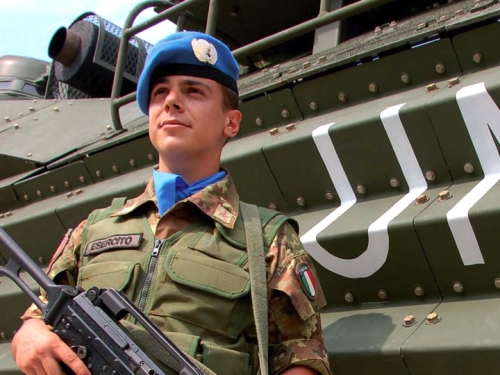
This article was originally published by Europe’s World on 9 April, 2015.
As tens of thousands of Western troops have withdrawn from Afghanistan in recent months, there remains a pressing need for peacekeeping troops in many other unstable parts of the world.
Samantha Power, the U.S. ambassador at the United Nations, recently asked Europe to contribute more UN peacekeeping troops. This may sound ironic as the United States stopped providing Blue Helmets after the 1993 debacle in Somalia, which cost the lives of 43 U.S. soldiers. Europe, however, should answer the American call. Studies show the deployment of peacekeeping troops can diminish the chance of renewed conflict by 80%. In recent examples, UN Blue Helmets have calmed the situation in northern Mali and prevented atrocities in the Central African Republic.
European countries are involved in military interventions, such as the current bombing mission against Islamic State in Iraq. That operation, however, is an example of peace-enforcement, not peacekeeping, and it’s a U.S. rather than a UN initiative.
One third of all UN Blue Helmets are provided by just three countries: India, Pakistan, and Bangladesh. This is mainly for opportunistic reasons, enabling those developing countries to benefit from the fixed monthly amount of $1,028 per soldier, provided by the UN and mostly financed by contributions from richer UN member states. That system has led some observers to label UN peacekeeping troops as a mercenary army for the West. France is the leading Western contributor to UN peacekeeping operations, but it’s ranked just 18th overall. European troops currently make up 7% of UN peacekeepers down from 40% 20 years ago.
This raises several problems. UN troops should by definition be recruited from all parts of the world. In addition, Western troops are usually better trained and equipped, so their presence increases the chances of a successful mission.
Studies show the deployment of peacekeeping troops can diminish the chance of renewed conflict by 80%
Fortunately, there is some progress. The Netherlands, for instance, contributes substantially to the peacekeeping mission in Mali, including with fighter helicopters. The UN department in charge of peacekeeping has recently opened a liaison office at the EU in Brussels.
Belgium’s case is less encouraging. After the trauma in Rwanda – where 10 of its peacekeepers were murdered in 1994 – Belgium basically left the UN peacekeeping business. Although the UN has learnt from its 1990s failings in Somalia, former Yugoslavia and Rwanda, and now endeavors to provide missions with a realistic mandate and the necessary military means, Belgian has favoured military operations under NATO or the EU rather than the UN. This situation only changed in 2006 with the reinforcement of the UN mission in Lebanon. Belgian participation in that mission also had opportunistic reasons as the country was lobbying to become a non-permanent member of the UN Security Council at the time. Since Belgium hopes to be part of the UNSC in 2019, perhaps the time is right for it to become more active in peacekeeping once again. Of course, there are risks, as the recent crash of a Dutch helicopter in Mali showed.
One third of all UN Blue Helmets are provided by just three countries: India, Pakistan, and Bangladesh
Recent history shows that bombing without stabilisation – peace-enforcement without peacekeeping – will not resolve conflicts. The best example is Libya. Four years after NATO-led airstrikes, the country is a jihadist hot-spot where the parliament has been forced by safety fears to convene on a cruise ship off the coast. The March European Council called for a political agreement in Libya and an immediate, unconditional ceasefire. The EU should go further and support the UN by sending peacekeeping (and later on peace-building) troops to finish the job.
Tom Sauer is an Associate Professor in International Politics at the University of Antwerp (Belgium) and author of Eliminating Nuclear Weapons: The Role of Missile Defence
Michel Liégeois is a Professor in International Politics at the Université Catholique de Louvain (UCL) in Belgium
For more information on issues and events that shape our world, please visit ISN Security Watch or browse our resources.

